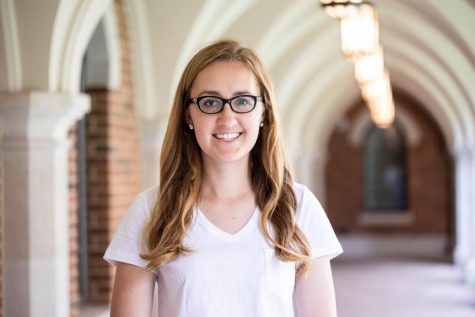This finals season, you may notice a change when you take exams: the regular blue books are being switched out for new green books. Last year, a student proposed that the school switch from the standard blue books to green books, which are made from 100 percent recycled paper. The Vanderbilt Student Government Residential and Environmental Affairs Committee worked with the Vanderbilt Barnes and Noble to enact this change.
Green books are just one way that several Vanderbilt groups are working to increase environmental sustainability on campus. In 2011, Vanderbilt Student Government created the Green Fund, an initiative created to provide funding for student-proposed sustainability projects on campus, in partnership with SPEAR. The Green Fund is led by a committee leader from VSG or SPEAR, the Chair of the VSG Residential and Environmental Affairs Committee, the president of Students Promoting Environmental Awareness and Responsibility (SPEAR), a student designated by the president of Vanderbilt Student Government, and two at-large members. Green Fund and the Residential and Environmental Affairs Committee are working to standardize recycling options on campus and increase sustainability. Patrick Timmins, Chair of the VSG Residential and Environmental Affairs Committee, says that often campus environmental groups like SPEAR and Vanderbilt Food Justice will work with the Green Fund to secure funding for their projects.
Funding was recently approved to build a green roof on Rand Dining Center to absorb rainwater, take stress off of the storm water drainage system and provide insulation to reduce heating costs. An impervious section of the roof will be covered in a layer of light soil with specifically chosen plants that won’t grow large foliage or deep roots.
The VSG Residential and Environmental Affairs Committee and SPEAR are also looking to increase recycling on Greek Row. A persistent issue has been a lack of adequate recycling receptacles. To alleviate this problem, the Green Fund purchased a large recycling receptacle that will be installed by second semester of this academic year. To encourage recycling within houses on Greek Row, Green Fund wants to introduce trash cans that look like red Solo cups and beer cans to designate where students should recycle their beverages. This program will be piloted in several houses following winter break, and will expand to all houses if it is deemed successful.
“If they are used in the houses that get them first, whatever houses those are, then we’ll try to expand it to all the houses,” said Timmins. “So that’s a cool thing because I know that there’s not been much work done in recycling in Greek Row for a long time.”
In the past several years, the Green Fund has implemented a number of noticeable projects on campus to encourage sustainability. Hydration stations are now available for students to fill their reusable water bottles in most buildings on campus, and a five-year plan is in place to put these stations in every building on campus. Currently, the Blair School of Music and all houses on the Martha Rivers Ingram Commons do not have hydration stations, although funding has been allocated to install them in Blair.
In the football stadium, bathrooms were updated to include new urinals. The old models, which were several decades old, used five gallons of water per flush, while the new models use one tenth of a gallon per flush. This renovation is projected to save 400,000 gallons of water per year.
Solar panels were installed on the Currey Tennis Center, and it is the only building on campus with solar panels at the moment. The Currey Tennis Center also has a solar hot water heating system to heat all water that is used in the building, saving $360,000 in natural gas usage each year. According to Timmins, this program has been the most successful initiative to come out of Green Fund yet.
Last year, VSG partnered with Vanderbilt Food Justice to implement a program to compost all coffee grounds on campus. Every Friday, Plant Operations lends Vanderbilt Food Justice a golf cart to collect the coffee grounds from each dining center on campus. The grounds are then composted at Vanderbilt Food Justice’s plot on the southwest corner of campus. Additionally, last year the Green Fund provided funding for Vanderbilt Food Justice to build a greenhouse on their plot, as well as a rainwater capture system to water their garden and apiaries to provide more pollinators for plants on campus.
The Green Fund also worked with Campus Dining last year to provide 99 cent coffee refills for students who use reusable mugs or cups. Timmins said that he would like to see a refill of coffee be free in the future because the difference between buying coffee for $1.26 as a side and 99 cents for a refill is so little.
Reflecting on all the changes that the Green Fund and other groups have made, Timmins stressees the importance of accessibility and ease of use.
“In general, we want to standardize recycling options everywhere… We know that if it’s not easy, students won’t do it,” Timmins said. “We’ve been talking in committee about ways to solve that.”
The Vanderbilt Student Government Residential and Environmental Affairs Committee and the Green Fund would also like to see the implementation of reusable to-go containers instead of paper to-go containers in all Vanderbilt dining centers. Several universities, including the University of North Carolina at Chapel Hill, already have reusable to-go container systems in place.
At Vanderbilt, students would check out reusable to-go containers with their Commodore Card when they buy their meal. Students would be limited to two to-go containers checked out at one time before they have to pay a small fee to rent another container. After they are done with a container, students would check them back in at a dining center cash register.
“It could be implemented by next year, but it would just take the dining services taking a big leap of faith,” Timmins said.
The Green Fund is also looking to provide covered bike parking with a green roof this coming year. This will protect bikes from weather, keeping them in better condition, while decreasing impermeable surfaces on campus. According to Timmins, the university is looking to design their own Vanderbilt-themed bike racks, which could be ready as soon as next academic year.
The Green Fund is beginning the process of accepting student proposals for the current academic year. Proposal workshops will be held on Wednesday, November 9 in Rand Dining Center and Tuesday, November 15 on the Martha Rivers Ingram Commons. Students can submit preliminary proposals in late November and early December, with a final deadline in late January for project proposals.



